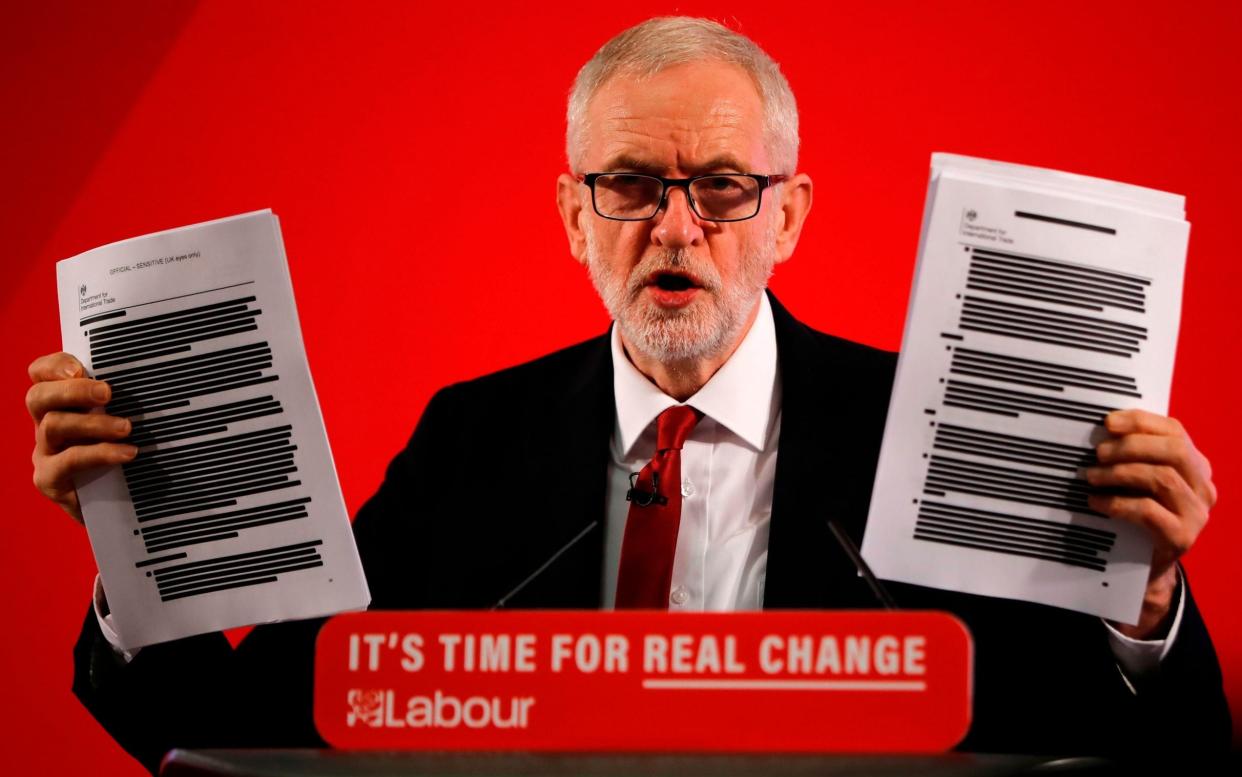Leaked documents brandished by Jeremy Corbyn 'stolen from minister's account by Russian hackers'

Russian hackers stole classified documents from the email account of a Cabinet minister before they were used by Jeremy Corbyn to attack the Government, it was claimed on Monday.
Former Trade Secretary Liam Fox was the victim of what appears to have been a "state-backed" operation ahead of last year's general election, sources said.
The news triggered a review of Government security as ministers and MPs were reminded of the need to follow rules set out by the National Cyber Security Centre, part of GCHQ.
If the claims – currently the subject of a police investigation – are proven, it would be the first time a current or former Cabinet minister had been successfully targeted by Russian hackers.
Last month, Dominic Raab, the Foreign Secretary, announced that "Russian actors" had sought to interfere in the December election "through the online amplification of illicitly acquired and leaked Government documents".
Mr Raab was referring to stolen details of US-UK trade negotiations which were published online and later used by Mr Corbyn to claim the NHS was being put up for sale.
The Foreign Secretary stopped short of saying who he believed had stolen the documents in the first place and how they were obtained.
According to a report by the Reuters news agency, Russian hackers accessed Dr Fox's account multiple times between July 12 and October 21 last year.
It is unclear which of his email accounts was hacked and when it was first compromised, or whether the successful attempt to access his email happened before or after he lost his role as Trade Secretary in a Cabinet reshuffle last July.
The report comes amid increasing tensions between London and Moscow, which have been building since the 2018 Salisbury poisonings.
Last month a report into Russian interference in democracy by Parliament's Intelligence and Security Committee concluded that Russia had attempted to influence the outcome of the Scottish independence referendum in 2014.
The Government also announced last month that a group of hackers linked to Russian intelligence had tried to steal details of Britain's research into a coronavirus vaccine.
Dr Fox's email account was reportedly hacked using a so-called "spear phishing" message, which tricks the target into handing over their password and login details. Sources said it was not clear whether the hackers who stole the trade documents were the same people who later leaked them online.
Previous reports had suggested one of Dr Fox's advisers was the victim of the hack.
Dr Fox, Britain's nominee for the post of Director General of the World Trade Organisation, was not available for comment on Monday night, but a spokesman for the Cabinet Office said: "There is an ongoing criminal investigation into how the documents were acquired, and it would be inappropriate to comment further at this point.
"But as you would expect, the Government has very robust systems in place to protect the IT systems of officials and staff."
The security of ministerial email accounts is the responsibility of each ministerial department working with the National Cyber Security Centre, which said: "The NCSC works closely with political parties, local authorities and MPs, who are offered access to the best cyber security guidance and support.
"We have worked closely with political parties for several years on how to protect and defend against cyber attacks, including publishing advice on our website."
Downing Street declined to comment on the report or on how the Government would ensure ministers' emails were not compromised in the future.
Sources cited by Reuters declined to name which Russian group or organisation they believed was responsible, but said the attack bore the hallmarks of a state-backed operation.
In the past, Moscow has repeatedly denied allegations of election meddling in Britain, France, the United States and other countries. Russia's foreign ministry described the latest British accusations by Mr Raab as "foggy and contradictory".

